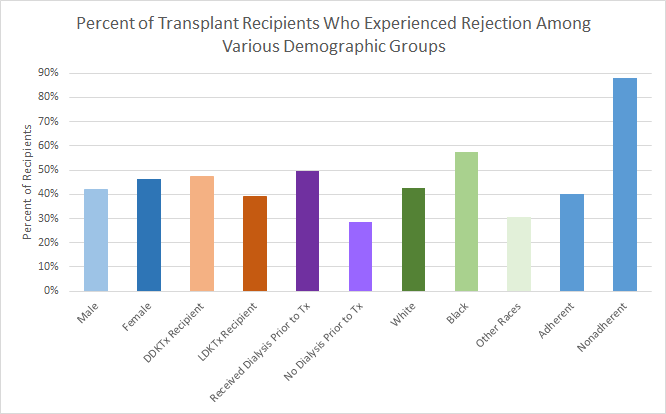Racial Disparities in Documentation of Non-Adherence and Its Relation to Rejection in Pediatric Kidney Transplant Recipients
Emory University, Atlanta, GA
Meeting: 2019 American Transplant Congress
Abstract number: C226
Keywords: Immunosuppression, Kidney transplantation, Pediatric, Rejection
Session Information
Session Name: Poster Session C: Kidney: Pediatrics
Session Type: Poster Session
Date: Monday, June 3, 2019
Session Time: 6:00pm-7:00pm
 Presentation Time: 6:00pm-7:00pm
Presentation Time: 6:00pm-7:00pm
Location: Hall C & D
*Purpose: Black patients have historically been disadvantaged throughout the transplant process. Many factors impact the success of kidney transplantation, but the need for strict adherence to medications and care recommendations, is well recognized. Prior studies report variable rates (11-69%) of documented nonadherence. We examine how documentation of nonadherence (NA) varies by race, and its impact on graft outcome, specifically with rates of rejection.
*Methods: We use USRDS data from 2005-2015 to examine racial disparities in documentation of nonadherence (NA) as reported via ICD9 codes, and the timeline to rejection. We selected all recipients, 0-21 years old, at time of transplant who received their first transplant within our study period, (N=11,419). We described rates of documented NA, donor type, and graft rejection in this population. We examined how these factors are associated with graft rejection and how they vary across racial groups.
*Results: 8.58% of patients had NA claims, with most occurring after transplant (91%) rather than before transplant (14%). Patients ages 16-21 were responsible for 55% of pediatric NA claims, while patients from 0-8 represent only 10%. 44% of pediatric transplant recipients had rejection at some point in the study period. Patients without NA claims account for the majority of cases of rejection(85%), but experience rejection at a much lower rate than patients with NA claims: 40% vs 88% . Black patients had more rejection than white patients (57% vs 43%) and more than double the rate of documented NA (14% vs 6%) (both P<.01). Patients who received dialysis prior to transplantation experienced almost twice the rate of rejection of preemptively-transplanted patients: 50% vs 28% (P<.01). Recipients of living donor transplants were 8 percentage points less likely to experience rejection than recipients of deceased donor transplants (39% VS 47%). Only 24% of Black patients received a LDKTx compared to 49% of white patients.
*Conclusions: Black patients are more than twice as likely to be documented as having NA as white patients and are more likely to face multiple factors that predispose them for rejection. Overall there appears to be underreporting of NA. This precludes the development of effective strategies to improve adherence and graft outcomes. Further studies are needed to explore barriers to NA recognition and reporting in pediatric transplant patients.
To cite this abstract in AMA style:
Melanson T, Hogan J, Maroney K, Patzer R, George R. Racial Disparities in Documentation of Non-Adherence and Its Relation to Rejection in Pediatric Kidney Transplant Recipients [abstract]. Am J Transplant. 2019; 19 (suppl 3). https://atcmeetingabstracts.com/abstract/racial-disparities-in-documentation-of-non-adherence-and-its-relation-to-rejection-in-pediatric-kidney-transplant-recipients/. Accessed February 22, 2026.« Back to 2019 American Transplant Congress

